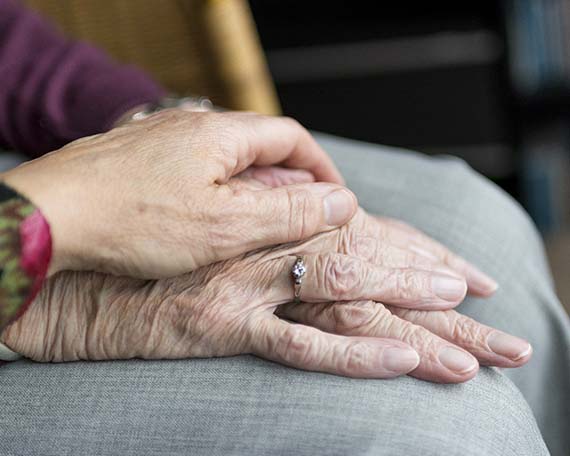
How Much Do Care Homes Cost?
Care costs in the UK have been increasing over the last decade and have been the highest in Europe for the last few years. There are many reasons for this, some of them being that the average life expectancy has increased and the cost of living has increased. Since the average care home fees have increased, it has become increasingly difficult for individuals to know if they will be able to afford care home costs.
Moving into a care home is often the most appropriate option for elderly people, once they reach a stage where they are unable to care for themselves and continue with their usual daily tasks. In this blog, we will explore the average care home costs across the UK and the financial support services available and who is eligible.
Care Home Fees in the UK
One of the reasons why the UK's cost of care is higher than in previous years is due to the rise in energy bills, food and the different types of facilities on offer. The most common types of care homes include a nursing home, residential home or all-inclusive care home. Some care homes will only include the care provided in the weekly fees, and any other amenities will come at an extra cost.
This would be suitable for individuals who would rather participate on a pay-as-you-go basis as part of their nursing care or residential care package. However, if a person would prefer to have everything included in one set price without the worry of extra costs, then an all-inclusive care home would be the most suitable option.
Average Cost of Care in the UK
According to Care Information Scotland, average care home fees are £762.62 per week for residential care costs. If you require nursing care, the average nursing home cost can increase to £888.38 a week. There are many online care costs calculator sites that you could use to get an estimated cost for you or your family member.
One specific factor that can affect the price of your care is your location. Care homes tend to be more expensive in urban areas such as London or Kent compared to those in other areas of the UK in more rural locations. The North East and North West of England are found to have the lowest average weekly cost.
Another factor that can cause the care home costs to differ is the services offered within the home, and whether they are included within the overall fee. A care home that provides a singular care type with minimal facilities will cost considerably less than one that offers multiple specialist care options and a range of facilities and amenities.

Costs of Respite Care
Respite care is a type of short-term care. This is offered to individuals who are recovering from an illness, surgery or hospital stay. This time will allow them to recuperate before returning to their usual daily routine.
Respite care is also appropriate for carers who require a well-deserved break. Family members can have peace of mind that their loved ones are being looked after to the highest degree by a registered nurse and in a safe environment which is especially important for those with Dementia. These costs are usually paid on a weekly basis for the duration of their stay.
Residential Care Home Fees
Residential care is also charged on a weekly basis and typically includes accommodation, meals and personal care in the total cost. Some care homes will include in-house social activities in these costs. It is important to double-check with the care home manager to find out what specifically is included in the flat fee of residential care.
Residential care is suitable for individuals who require additional assistance with their daily tasks such as dressing, washing, housekeeping and mobility, requiring long-term care. Individuals can typically live independently and continue doing the things they love with a host of facilities and activities to enjoy.
Nursing Care Costs
Nursing care is suitable for individuals that require high levels of personal care and medical care, unable to properly support themselves at home without 24-hour care and support due to a specific health condition or terminal illness. This is similar for individuals who require dementia care. A nursing home is typically a more expensive care home than any other kind of care because of the level of needs being catered for, provided by a team of nurses.
Nursing home fees, however, will still include meals and accommodation in addition to daily medical services and 24/7 nursing care as part of the weekly cost.
What to Expect From Care Home Fees
When residing in a care home, you should expect to receive high-quality, 24-hour care within a safe environment, where health and well-being needs are taken care of, regardless or whether you're residing in a nursing home, residential care home or an all-inclusive care home. Typically, when looking into what you receive when you pay for care, you should expect accommodation, meals and 24-hour care services. Additionally, you might be offered daily activities that will be included in the overall fees.
It is important to get in touch with the care home you're interested in when finding out exactly what you will receive as part of their costs, as each care home has its own set of services and facilities.
Living in an All-Inclusive Care Home
All-inclusive care homes have grown over the last few years, as it has become more appealing for individuals to have everything included in the fee, for a 'better' lifestyle. As part of an all-inclusive care home fee, you should expect to receive accommodation, meals, care, facilities and social activities as part of your care package.
Because everything that the home offers is included in the weekly fee, this type of care home is typically more expensive. However, you won't incur any extra fees and you can make use of whatever you have access to on an unlimited basis.
The cost of living in the UK has increased rapidly, meaning a lot of people feel uncertain that they have the savings and assets to pay for care costs. With an all-inclusive care home, all fees are paid on a weekly basis with no hidden costs, meaning it gives both care seekers and their loved ones peace of mind during this time.
The cost of your care whilst residing in an all-inclusive care home is very dependent on your care needs, and you should contact the home direct to find out specific figures.
Who is Expected to Pay Care Home Fees?
Typically, the care seeker or their family members would be paying for care home fees per week, making them a self-funder. However, not everyone is in a position to make this happen. If an individual is in a position where they need care but can't afford to pay for it, they may be eligible for financial support from the local authority or through NHS Complex Clinical Care. A means test is usually carried out to find out an individual's savings threshold, ensuring they have enough personal expenses allowance after they receive the funding support.
If you believe you are in a position to be self-funding the cost of your care, it is essential to get in touch with a financial advisor who will be able to give more insight on how far your money will go. They will also give you and your family members advice on what financial help may be available.

How Would You Approach Funding the Cost of Your Care?
If you think you may be eligible for financial help, the first step would be to contact your local authority. Your local council would carry out a financial assessment and means test to determine your income, savings and assets to see if you meet the threshold for financial support. They may look into equity release as one of the options to contribute towards the cost or would create a personal budget that they would pay for.
Complex Clinical Care is available to those who require significant care due to their primary health needs, whether this may be mental or physical. Unlike a means test, this assessment focuses solely on the person's care requirements to determine if they qualify for this by having a primary health need.
In cases where the care seeker doesn't meet the criteria for local authority funding or Complex Clinical Care funding, they have the option to look into a deferred payment agreement. With this arrangement, the local authority provides a loan to cover the care costs, typically using the individual's assets, like their home, as collateral. Repayment of the loan is then made when the assets are sold, with interest added to the repayments.
It's essential to understand that financial aid is not guaranteed, and some care homes may not accept funding support. Therefore, before visiting a care home or nursing home, it's crucial to enquire whether they accept financial help from a third party.
Self-Funding Your Care Home Fees
An individual is considered a self-funder if they can pay for care home fees themselves, making them someone who doesn't require assistance towards the cost of care by a local authority. Being a self-funder makes you fully responsible for the costs of care.
As we previously mentioned, care home fees can vary depending on numerous factors including the location of the home, the size of the home, the in-house amenities and the care they offer. Moving into a care home is a major financial commitment for both you and your loved ones, so you need to consider all the costs you may end up paying.
What is Included in Local Authority Funding
Your local authority may offer financial support to you for your care home expenses. To determine eligibility, a means test is conducted, evaluating the person's assets and income. If the individual meets the criteria for funding support from their local council, they will receive payment to cover the basic home fees. However, the amount may vary depending on the specific local council and the cost of care.
Occasionally, individuals may qualify for partial coverage of the care costs, and in these cases, they might need to pay a top-up fee to bridge the gap of the remaining cost. It's important to remember that most councils generally do not contribute to personal expenses allowances, such as accommodation, meals personal items, trips out or social activities.
It's crucial to be aware that not all care homes accept local council funding and may primarily accommodate privately paying residents. Therefore, before making any arrangements, it's essential to enquire whether a care home will let the local authority pay or contribute, or if it is exclusively for individuals that are paying privately.
What to Expect From Complex Clinical Care
Complex Clinical Care refers to the financial contribution provided by the NHS to individuals with significant healthcare needs. This comprehensive package covers care home and nursing home fees, along with other healthcare-related expenses. Eligibility for Complex Clinical Care is determined by an assessment of the person's healthcare requirements. A means test will also be carried out to decipher if the individual should contribute towards accommodation costs.
To qualify for Complex Clinical Care, individuals must have complex and ongoing healthcare needs, such as severe disabilities, long-term illnesses, or terminal conditions. The evaluation process is carried out by healthcare professionals, like registered nurses or doctors, who assess the complexity of the required care and the individual's overall needs.
For those meeting the criteria, Complex Clinical Care covers the entire cost of care fees, but not fees associated with accommodation. It does however extend to other healthcare expenses, including medical equipment and medications.
However, it's important to understand that Complex Clinical Care funding is not guaranteed, as eligibility depends on individual circumstances. In cases where someone does not qualify for NHS funding, there might still be other forms of support towards care fees available, such as funding from the local authority or deferred payment agreements.

Live an Enriched & Independent Life at Queens View Harbour Care Home
Queens View Harbour is a purpose-built care home in Troon, Scotland providing exceptional levels of Nursing Care, Residential Care, Dementia Care, Respite Care and Palliative Care. Our residents have access to a variety of medical services included in their fees ensuring their wellbeing is always the top priority. Our team of dedicated and supportive nurses are on hand 24/7 to provide residents with a first-class way of life.
We are an all-inclusive care home which means that any care services, in-house facilities, meals, energy bills, lodging and trips out are included in the cost per week. A personalised care plan is created for residents by collaborating with them and their loved ones to carry out a needs assessment. This will outline all of the care needs, preferences, and support levels which means that we can offer our residents a continuum of care.
It is essential to us that our residents live an enriched & independent life at Queens View Harbour and make this a possibility through our expansive in-house facilities. Throughout the day, our residents have access to a weekly entertainment programme, expert hair stylists, an equipped cinema room and our beautiful landscaped gardens. We strive for our residents to fill their days with the things they enjoy alongside like-minded individuals and our brilliant facilities help to make this happen.
We understand that paying for care can be a difficult time for some individuals and are on hand at all hours of the day to provide support. Our staff has undergone extensive training to ensure both our residents can receive around-the-clock support no matter their healthcare needs.
Find Out More About Our Care Home in Troon
If you have any further enquiries regarding our care home, care services or our fees, get in touch with us today by calling 01292 435971 or emailing info@queensviewharbour.co.uk. We look forward to hearing from you.





